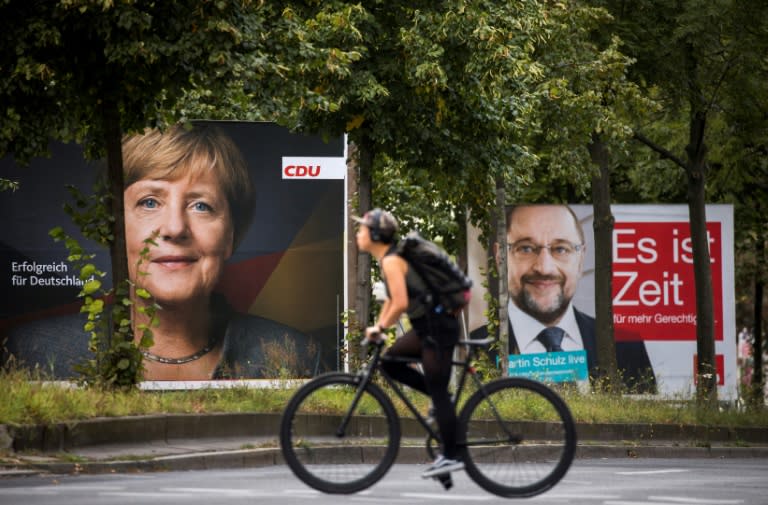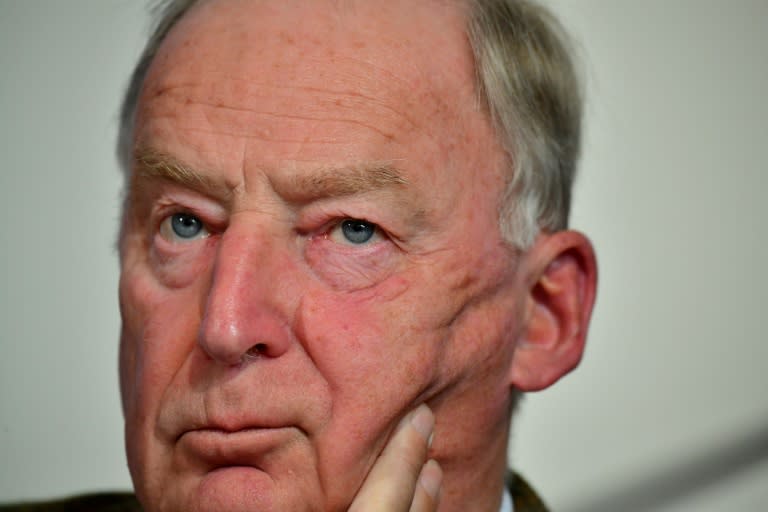'Bring home the bacon,' Merkel tells voters on eve of poll
Chancellor Angela Merkel and her rival Martin Schulz rallied voters on the eve of Sunday's election, urging Germans to shun the first hard-right party expected to enter parliament in force since the end of World War II. Merkel, the clear frontrunner after 12 years in power with a double-digit lead, also told her conservative base not to get complacent and to cast their ballots, rousing them with a folksy call to "bring home the bacon". Her Social Democratic (SPD) rival Schulz told voters to reject the "sleeping-pill politics" of the famously cautious chancellor nicknamed "Mutti" (mummy) in a passionate Berlin speech Friday, and to vote against "another four years of stagnation and lethargy". On Saturday he told his supporters they gave him "courage on the home stretch" and that "no matter what happens, it was a great campaign". Both Merkel and Schulz implored voters to resist the right-wing populist Alternative for Germany (AfD), which has railed against the influx of around one million mostly Muslim migrants and refugees, half of them from war-torn Syria, Iraq and Afghanistan. The party with links to the far-right French National Front and Britain's UKIP has been polling at 11-13 percent and is expected to enter the opposition benches of the Bundestag, heightening its visibility and state financing. The International Auschwitz Committee warned that the "conglomerate of anti-Semites, enemies of democracy and nationalistic agitators" will bring "an inhuman coldness" to the glass-domed chamber of the Reichstag building. - 'Shame for our nation' - Merkel -- who has been heckled and booed as a "traitor" by AfD followers -- headed back into one of their strongholds Saturday, her Baltic coast constituency where the anti-Islam party beat Merkel's Christian Democrats (CDU) in state elections last year. At Merkel's final major stump speech Friday in the southern city of Munich, activists had tried to drown her out with whistles and vuvuzelas and chants of "get lost". But the 63-year-old refused to be derailed from her stability-and-prosperity stump speech, telling the crowd that "the future of Germany will definitely not be built with whistles and hollers". Schulz, for his part, recalled with pride the SPD's history of resisting the Nazi regime and told the Berlin rally that "this Alternative for Germany is no alternative. They are a shame for our nation." Foreign Minister Sigmar Gabriel, also a Social Democrat, warned that "for the first time since the end of the Second World War, real Nazis will sit in the German parliament". One of two AfD leading candidates, Alexander Gauland, has called for Germans to shed their guilt over two world wars and the Holocaust and to take pride in their veterans. He has also suggested that Germany's integration commissioner Aydan Ozoguz, who has Turkish roots, should be "disposed of in Anatolia". Forsa polling institute chief Manfred Guellner predicted that the AfD will soon spark its own decline through its chronic infighting, and added that its rise was "unfortunate but no catastrophe because Germany as a whole is a solid democracy". - Lacklustre campaign - Aside from the hard-right populist noise, the past two months of campaigning by the major parties have been widely criticised as lacklustre and uninspired, with few hot-button issues dividing the main contenders. For the past four years, Merkel's CDU has ruled Europe's top economy with the Social Democrats as its junior partner, a time during which both parties have broadly agreed on major policies, from foreign policy to migration. In a last-ditch bid to stir voters, the SPD's Gabriel accused Merkel of caving in to the demands of US President Donald Trump by pledging to raise defence spending to two percent of GDP. "Germany is the voice of peace and disarmament and not the European offshoot of Trumpian military armaments policy," he said. Governing in Merkel's shadow has cost the SPD voter support, and polls give it 21-22 percent compared to 34-36 percent for Merkel's conservative bloc which also includes the Bavarian CSU. Looking at the surveys, many rank-and file SPD members wonder whether the traditional working class party needs a stint in opposition to rekindle its fighting spirit. This would leave the presumed winner Merkel in need of new coalition partners -- possibly the liberal and pro-business Free Democrats, who are hoping for a comeback after crashing out of parliament four years ago. Another potential partner is the ecologist and left-leaning Greens party, which however starkly differs with the FDP on issues from climate and green energy to migration policy.

 Yahoo Finance
Yahoo Finance 

